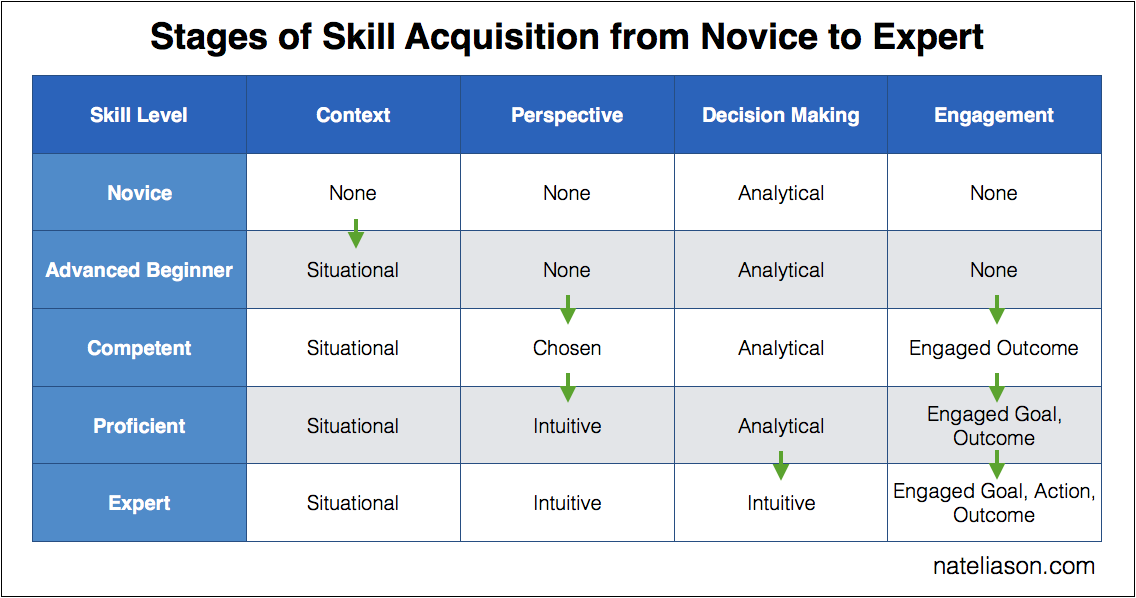Expertise
Expertise vs. Knowledge
Expertise isn't just knowledge, it's knowing how to apply that knowledge to make better decisions.
Knowledge is information and can be easily communicated. Expertise is tacit and discovered in practice. By definition, expertise is something you only get through work.
What we learn in practice is always much more thorough and complex than what we could put into words. That is why even purely theoretical work cannot be reduced to explicit knowledge, intuition is not the opposition to rationality and knowledge, it is rather the incorporated, practical side of our intellectual endeavors, the sedimented experience on which we build our conscious, explicit knowledge.
"Strategy" is expertise by another name.
Expertise & Writing
writing can be used as a tool for refining expertise, but it isn't a substitute for doing work to gain knowledge. Maybe the balance is that experience gives you new, unrefined information, and writing is a tool to help you process said information.
Philip Morgan advocates using a daily writing practice as a means of building expertise.
Teaching what you know forces you to do a gap analysis on your expertise. When writing, you’ll figure out what you don’t know, and research to find those answers. It also requires you to retrieve and repeat the information in your head, which reinforces your knowledge. Here's the science to back this up.
Cultivating Expertise
When building expertise, focus on a narrow part of a skill, and go deep. Expertise lies in depth, not breadth. Related to positioning.
Practicing anything helps you build the meta-skill of building skill. That's something you can transfer to any domain.
How do you encourage building expertise? A good training program, along with the time, space, and tools for practice.
The Dreyfus Model of Expertise
Hubert and Stuart Dreyfus, researchers on expertise, have a simple explanation: Teachers tend to mistake the ability to follow (their) rules with the ability to make the right choices in real situations.

- 1: Novice
- Defining element: relying on recipes. can't come up with solutions from scratch.
- Context: none. Don't understand why they are doing things.
- Perspective: none. Doesn't know what's important and what's not.
- Decision making: analytical. Can look at information but doesn't have a way to process it.
- Engagement: detached. They are just following a script.
- Challenge: No system for debugging. When the recipe fails you blame the recipe.
- 2: Advanced Beginner
- Defining element: recognizing aspects. Can begin to troubleshoot for yourself.
- Context: situational. Can identify cues. Can start to understand when to apply which recipes.
- Challenge: Still cannot tell which information is important and which isn't.
- 3: Competent
- Defining element: has a much wider set of rules and cues. Making these decisions leads to increased emotional engagement.
- Perspective: chosen. Instead of listening to other's advice, you start making decisions on which recipes to use and why.
- Engagement: You are more engaged in the work. When things don't work you don't blame the recipe you blame yourself.
- Challenge: Learning not to beat yourself up when things go wrong, but to instead look at data.
- 4: Proficient
- Defining element: An intuitive sense of what the goal should be in a situation.
- Context:
- Perspective: Intuitive. You no longer have to manually think through situations.
- Decision making:
- Engagement: Involvement in a good goal and a good outcome.
- Challenge:
- 5: Expert
- Defining element: can make decisions without articulating why.
- Context: situational. Knows what variables are important, and which ones to ignore.
- Perspective:
- Decision making: Intuitive
- Engagement: Involved in goals, choices, and outcomes.
- Challenge: